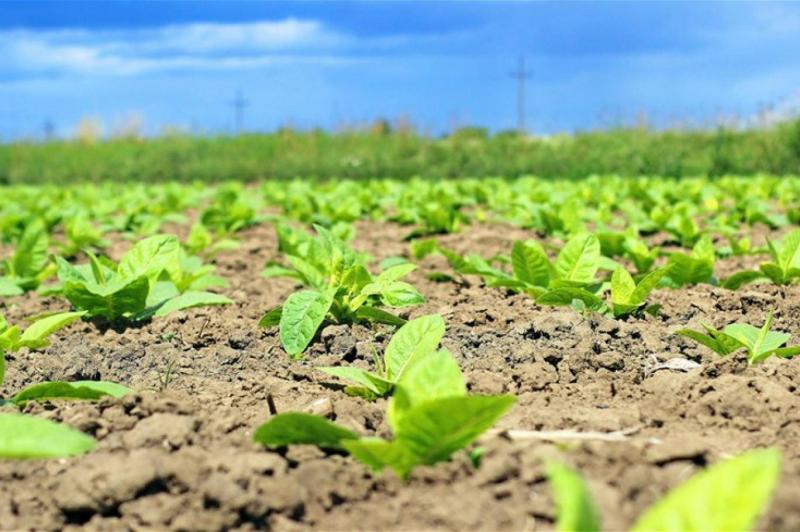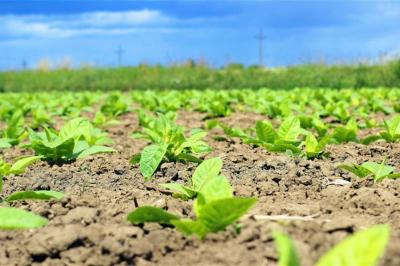Only two out of 885 tobacco farmers in the border town of Ayta Shaab in southern Lebanon managed to cultivate their lands this year. Israeli shelling has prevented hundreds of farmers from planting their fields in the border villages. The only town where tobacco farming remains active is Rmeish, a relatively neutral Christian town lacking "Hezbollah" presence, where most of the land is cultivated aside from fields far from the town, close to the borders.
Traditionally, the south has relied on tobacco farming, a thriving activity due to its low water needs. This activity has economically empowered the local population over the years and received support from the Lebanese Tobacco and Tobacco Administration (REGIE). A majority of the region's residents, particularly in the districts of Tyre and Bint Jbeil, cultivate tobacco, including individuals from all sects. The number of tobacco farmers in Lebanon is about 25,000.
### Urgent Plan by REGIE
Tobacco farming exists in several Lebanese regions. Northern Lebanon produces approximately 1.4 million tons annually, while the Bekaa used to produce around 1.7 million tons yearly. However, this season, more than 60 percent of the crop was affected by a recent heatwave. In the south, tobacco production has decreased from 5 million tons in 2019 to 1.9 million tons in 2023, and it is expected to drop to around 1.2 million tons this year, according to REGIE's agriculture and purchasing director, Jaafar Al-Hosseini. This implies an 80 percent decline in production in the south compared to 2019.
Al-Hosseini noted that REGIE intervened with farmers from the first week of the war, renting storage warehouses in safe areas instead of those located in border villages. They also advanced the harvest delivery dates so farmers could submit their crops before the fighting intensified and forced displacements.
To compensate for the losses due to halted farming in the frontline, REGIE established free nurseries in safe villages to assist farmers and encourage them to invest in tobacco cultivation.
### Reduced Production and Incendiary Shells
The damage is not limited to reduced production; Israeli bombardments using incendiary phosphorus shells have targeted fields previously planted with tobacco in the outskirts of the noon and Marjayoun plains, depriving their owners of future cultivation. Israeli bombardments in the town of Adchit in the Nabatiyeh district resulted in the burning of 2,500 kilos belonging to a farmer in the area.
### Rmeish Saves the Tobacco Season
The Christian town of Rmeish, the third largest in tobacco cultivation, saw over 700 of its farmers manage to cultivate around 80 percent of the town’s land this year. However, fields in areas considered "war zones" in Qatmon and Hermon near Rmeish have been inaccessible to farmers.
Rana Abdoush, a farmer from Rmeish who inherited the profession from her father, told Asharq Al-Awsat, "This year's tobacco farming is different from previous years, particularly due to the dangers facing farmers. Several have been subjected to intimidation attempts by the Israeli army through gunfire near them." Regarding the assistance received by tobacco farmers, she noted that REGIE supported them with necessary agricultural medicines and equipment, but she hopes that "REGIE" will raise the price per kilo, especially given the hardships faced by southerners due to Israeli aggressions.
### Ayta Shaab and Aitaroun: The Catastrophe
In the border towns of Ayta Shaab and Aitaroun, out of 1,673 farmers, only two managed to cultivate tobacco in the plains of Ayta Shaab, while 13 farmers did so in towns where they had been displaced. As for the remaining farmers from Ayta Shaab and Aitaroun, they have lost their sole source of income.
Ibrahim Abdel-Moneim, a 47-year-old farmer from Ayta Shaab, refused to leave his town, which faces daily Israeli bombardments, and insisted on cultivating his land despite the looming dangers. He recounted, "My mother was a farmer, and I am just like her. A tobacco seedling is our lifeline. Tobacco farming has helped us educate engineers and doctors..."
Concerning the risks he faces, especially since the town is surrounded by several Israeli positions, notably Malakiyeh, Biadi Blida, and Avivim barracks, Ibrahim stated, "There is definitely fear; in the end, we are human. Anyone who chooses to live in this town knows that their life may be the price." He also mentioned losing part of his harvest due to an interceptor rocket falling on his cultivated land, leading to the burning of seedlings.
### Marouhin… Zero Production
The situation in the town of Marouhin mirrors that of Aita Shaab. All of its 1,200 residents, who depend on agriculture, have fled, according to Muhammad Ghannam, the mayor of Marouhin. He pointed out that there are about 40 tobacco farmers in the town, none of whom have been able to cultivate their lands, further warning that damage could extend to the coming years due to bombardments with internationally banned phosphorus bombs.
### Forced Displacement
Khalil Dibb, a member of the Tobacco Farmers’ Association, stated to Asharq Al-Awsat that farmers are "the most affected segment due to forced displacement caused by the Israeli aggression on one hand, and the low prices adopted by the administration when receiving the crops on the other." He added, "The aggression coincided with the start of preparations for the season, so they fled their villages without alternative lands in the villages where they sought refuge."
Dibb called for REGIE to develop a mechanism, alongside the South Council, that considers the farmers' situation and prioritizes compensating them to cover the burdens from displacement.
### In the Hinterlands
The farming situation in the hinterlands is marked by fear of Israeli targeting of farmers, as seen with thyme farmers in Shuqra, where Ghada Abadi was killed by an Israeli drone while harvesting her crop. Some continue to farm despite rising costs and a shortage of labor.
Hikmat Khalil, a 64-year-old farmer from the town of Sarifa, stated that he managed to educate and support his children through tobacco farming. Today, his daughters join him in tobacco cultivation, adding, "In the past, I would plant about 70 dunams; today, I have planted only 50 due to labor shortages and rising labor costs."
### Deir Sayran and Taybeh
In Deir Sayran, which neighbors Taybeh—a town that faces bombardments on its outskirts—fear did not prevent Mona Nasser and her siblings from cultivating their land under the motto, "Those who do not plant will regret it." Mona, who planted only 7 dunams (7,000 meters square) due to a lack of available labor, does not hide her fear, but continues to seek a way to live, noting that without tobacco, they would not be able to secure their daily sustenance.




